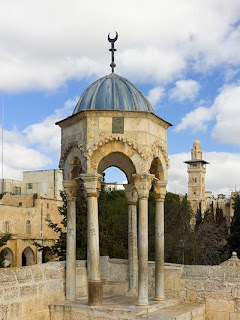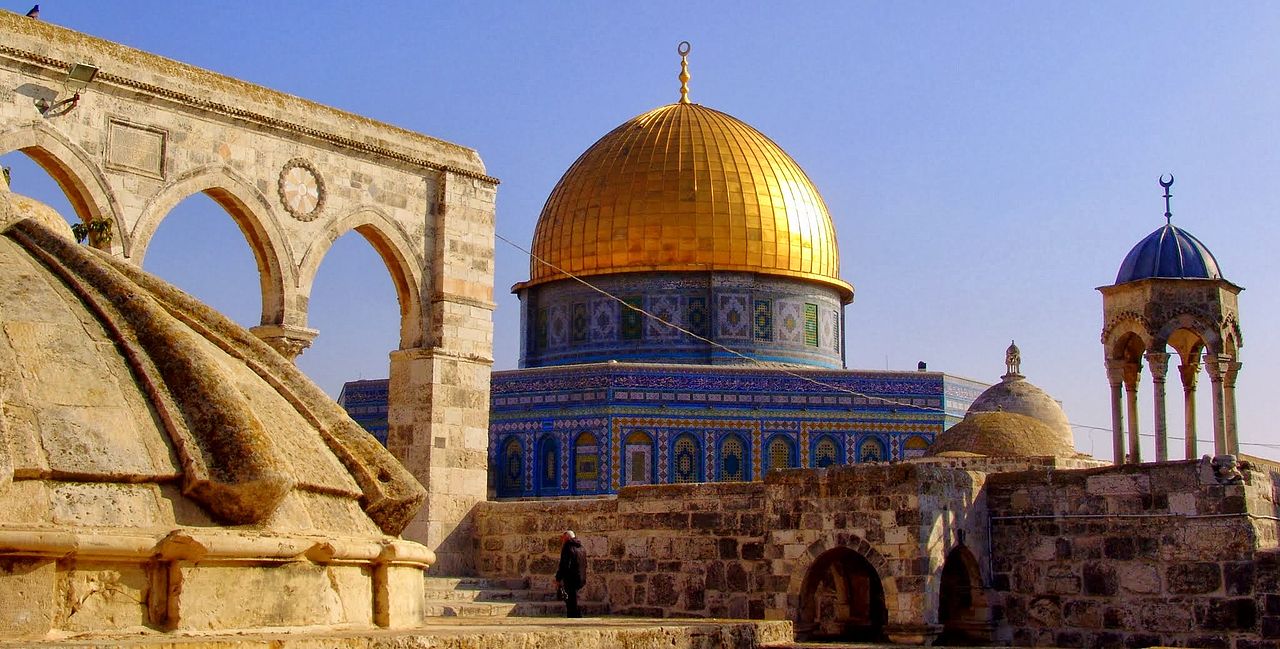Moslem Cosmogony: I found this to be rather interesting in that the order of
creation being the tablet, the pen which would be used to write on the tablet
with, water, his throne, the winds, and then the serpent. Also although Allah
(God) predetermined all that was to come: past, present, good or bad. I think
that people still have the free will to change their destiny even if they were
originally meant to adopt jehennum (hell). I think the creation of the water is
described in a very eloquent and beautiful manner as it was said to be a pearl. I
think the scientific context of such an old text is somewhat baffling as it
mentions the creation of the mountains and its purpose being that so the earth
does not move around. It is also interesting that it goes to explain why we get
earthquakes being as a result of the movement of the bull which holds up the
feet of the angel whose wings causes the earth to be stable. I personally have
never come across such information in the actual Islamic religious text.
Our father Adam: Interesting how the dust which was used to create Adam was
collected from earth itself and not from the heavens. Also, that it was not
just one type of dust but a variety of different colors thus reflecting the
diversity of men today. Similarity is seen here between the Christian text that
satan/iblis was amongst the angel but upon refusal was expelled from the
heavens. Although the reason of his expulsion varies in both faiths. Also Iblis
was not considered an angel here. Also it is almost like a Greek myth that Adam
was both male and female on each side and that the female was split from the
man hence the creation of Lilith also known as El Karineh and she was too was
evil like in the Christian myth. Leading to the creation of Eve (Hawa) and she
was created from his rib. Here also Satan persuaded Eve to eat from the forbidden
fruit thus leading them both to be cast out of heaven. It is interesting how
each of them; the serpent, Satan, Adam and Eve were expelled from paradise
through different gates causing them to land on different parts of earth.
Imagine the loneliness and fear Adam and Eve felt for two hundred years
Noah: Noah was considered a prophet. Noah lived a a very long time
but had very few followers including his wife Wa’ileh and his son Canaan.
Imagine having a task to fulfill and having your nearest and dearest be amongst
those that reject you. And being perceived as a mad man when he informed
mankind of the flood that was to be sent. Personally I do not like the categorization
of having the three type of women as a result of the women then.
Job (Ayub) and his family: I think Job is a very grateful man of God as even with his
skin disorder being a trail against him he remained thankful and always grateful
to God. His wife also was very faithful to him fulfilling the in sickness and
in health vow. I think in most religious text women are always the root evil or
the root in which Satan enters and causes them to be weak.
Lokman: I think it is rather shallow how Lokamn being black, with
thick lips is described as a deformity here. Beauty then probably was accepted
to be different then it is today I suppose. So in compensation God gave him
wisdom. Also it is amazing that these great men of God could have chosen to be
kings, and masters but instead some of them were ill, poor, and in Lokmans case
was a slave. Even though he was not a doctor, but because of the wisdom he possessed
he was able to perform an operation on a sick man who had a serpent eating up inside
of him. Even though he possessed wisdom he wasn’t to prideful or boastful in
admitting that he didn’t know how to do certain things.
Abrahim the friend of God: Nimrod reappears in the time of Ibrahim as he is mentioned
in the book of Noah and the ark. His character is the exact same is described
in the Jewish and Christian texts. This story is similar to the story of Moses
as the pharaoh killed all male children born. Nimrod did the same as he saw a
dream that a male child will destroy him. Ibrahim was a child that possessed many
miracles as did, Jesus, and Noah. He was also a child of wisdom as he already
had the innate feeling of just one God.
The deaths of Moses and Aaron: I think it amazing how people back then were able to converse
with the angels as in the this case the angel of death whilst taking Haruns life.
Mosa was also given the freewill to
choose when he was ready to die just like Ibrahim. In Moses case he refused to
die when the angel of death came to him. Which I thought was quite funny. Moses
was a hot tempered man and very stubborn in this text.
Solomon: In the chapter before this we see that Solomon possessed great
power and strength in that he was able to mold stone with his bare hands. He
was able to communicate with the animals. The idea of botanical gardens which
most of us enjoy today came from Solomon. Not only was he the ruler over men
but also the ruler of the jan which were another form of mischievous creation.
It is amazing that Solomon was dead for a while before anyone knew of his death
and so they continued to obey his orders until the worm ate from his staff
causing it to collapse thus the fall of Solomon.
El Khudr and Moses: I am more familiar with this story of El Khudr and Moses
journey. But in a slight different context. It just goes to show that even if
you are a prophet of God they were not the most knowledgeable amongst men. As
El khudr Knew of some event that was to come that Moses knew not of. Hence the
Moses constant questioning.
(Dome of Rock, Chapter: David, Folklore of the holy land by J. E. Hanauer. Date: 1907)


